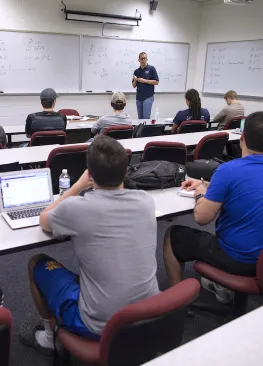What can you do with a mathematics degree?
Every industry needs people who can think analytically and thrive in problem-solving environments. As a Mathematics major at Marietta, you will establish a foundational basis of calculus and will have the opportunity to pursue study in a variety of fields such as Probability, Numerical Analysis and Financial Mathematics, as well as theoretical mathematics. We also offer a BIG Problems course, which pairs students with an industry/non-profit/government organization to help them solve a problem using mathematics.
Students who major in Mathematics at Marietta College develop the skills that allow them to excel in a variety of fields and graduate school. In a data-driven world, a degree in mathematics prepares you for in-demand jobs with titles such as Data Scientist, Operations Research Analyst or Actuary. Graduates who blend strong communication skills — which are developed through Marietta's liberal arts curriculum — with the abilities to process data and to think critically will always be in demand.




What You’ll Learn While Studying Mathematics
As a math major at Marietta, you will have access to the best technological resources. You will learn to use graphing calculators and advanced mathematical software that does the number crunching and algebraic manipulations, leaving you more time to understand the ideas and the theory behind the numbers.
Capstone Projects
All mathematics majors work one-on-one with a faculty member on a senior capstone project. Some projects are expository in nature, while others deal involve partial solutions to open problems. Students write up their findings in a formal paper and present their results to the faculty and other students. Students whose projects are exceptionally good are encouraged to present their results at regional and national mathematics conferences and/or submit their papers for publication.
Growth Opportunities
Students who major in Mathematics at Marietta College develop the skills that allow them to excel in a variety of fields and in graduate school. The Bureau of Labor Statistics reports that employment in math-related occupations is projected to grow 29 percent — more than 47,000 new jobs — through 2031.
More Info
Math majors can also pursue an Adolescent Young Adult Licensure through Marietta’s Education Department. Completing the dual curriculum qualifies them to teach regular math students in grades 7-12.
- Outcomes — Capstone Projects
- Duration, Convexity and Immunization Effects on Portfolio
- The Matrix-Tree Theorem and Its Applications
- Introduction to Chaos Theory
- Mathematical Methods in Common Clustering Algorithms
- Outcomes — Graduate Programs
- Columbia University — Statistics
- Wright State University — Applied Mathematics
- Shawnee State University — Mathematics
- New York University-Courant — Financial Engineering
- Ball State University — Statistics and Social Psychology
- Case Western Reserve University — Mathematics
- Outcomes — Professions
- Norwalk City School District — Math Teacher
- Citi Financial Service — Manager, CCAR Model Scoring
- Pillar Technology — User Experience Architect
- Insight2Profit — Director
- Center for Data Analytics
- Hall Financial — Client Services Assistant
- Honor Societies and Student Organizations
Kappa Mu Epsilon is the national honorary mathematics society for academically outstanding Mathematics majors. Students are also invited to join the College’s math club, (mc)2, which hosts visiting speakers, offers free tutoring to fellow students who need help in introductory math levels, and hosts special functions.
- Does the department accept AP credit toward the major?
The department recognizes the accomplishments of students who have AP credit in mathematics. Any student who scores a 3 in AP Statistics will get credit for MATH 223.
- What can a Mathematics major do after graduation?
A major in Mathematics is good preparation for many types of careers, as well as for medical school, dental school, law school, and graduate work in mathematics, statistics, and such varied fields as biostatistics, business administration, computer science, engineering, linguistics, operations research, and philosophy.
There is a demand for qualified mathematics teachers in the nation's secondary schools. Insurance companies hire mathematics majors in entry-level positions and as actuarial trainees. Statisticians can find employment in the insurance, telephone, and pharmaceutical industries, as well as in government agencies such as the U.S. Census Bureau or the U.S. Department of Labor. Applied mathematics jobs are available supporting scientists, engineers, economists, etc. Businesses, banks, and the computer industry also have openings for mathematics majors.
- Is it possible to double major?
Yes. Popular second majors for our students have been Economics, Computer Science, Actuarial Science, and Physics. Mathematics is also a popular second major for students in Computer Science, Accounting, and Finance.






